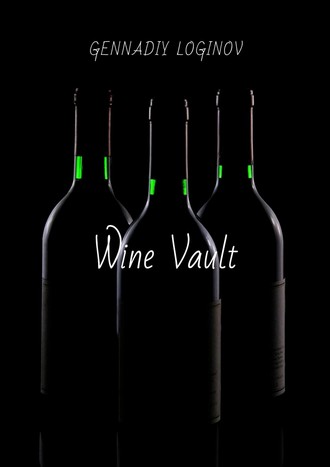
Полная версия
Wine Vault

Wine Vault
Gennadiy Loginov
Translator Mariia Eroshkina
Editor Jen Duncan
© Gennadiy Loginov, 2020
© Mariia Eroshkina, translation, 2020
ISBN 978-5-4493-6666-5
Created with Ridero smart publishing system
Wine Vault
A bottle of wine contains more philosophy than all the books in the world.
– Louis PasteurThe pleasure a man experiences from consuming wine is no match for the pleasure that wine experiences when it is consumed. But it is known that there are no two wines alike in this regard. There are easily accessible copies which immediately begin, as they say, “to circulate” before they can find themselves in the bottles, and people, draining the bottles of such wines to the bottom, soon lose interest. But there are also rare exclusive samples: they lie in the darkness of the cellars for many years, gradually accumulating a noble touch of dust, waiting for their hour. A bottle of one of these collectable wines was in a special storage of a special cellar, in the cold and darkness, conditions that were created for it. For some reason, they were considered comfortable.
At the time, this bottle was one of several in the main cellar; there was a great variety of wines from around the world, differing in age and colour, whether young, vintage or mature, amber, red or pink. This was the Tower of Babel indeed, with its constant chattering and polyphony invisible to people. Wines from France, Italy, the Caucasus, Hungary, Russia and other parts of the world, talked, joked, asked each other about the world, argued about all kinds of differences between young and mature people, their sorts and quality. Some claimed that Caucasians are the best in wine drinking, others praised the Italians or the French, or someone else, but this, as we know, was a matter of habit and taste. Sometimes the wines would fight with each other: either on the basis of mentality differences, or on the basis of age differences, and even without any apparent reason. But those were relatively “simple” wines – even though expensive and respectable.
Meanwhile, in an exclusive store, set apart from all the others, collectable wines pass their time bleakly. They were considered the best and valued above all others combined, and over the years their cost only increased, but there was no sense, no benefit, no joy in it for the wines themselves. Their gastronomic value was dropping to zero because no one drank such wines. They were purchased individually or in small rare collection batches by wealthy people or specialized museums and not for drinking at all, but in order to keep in their cellars and be proud of them, boasting at every opportunity, and then, when they were tired of possessing such, – sold or presented to other rich people or museums. And, of course, these people didn’t care about the deep feelings, personal tragedies or dramas of some bottles of wine.
For the time being, it seemed to a certain bottle of collection wine that things could not be worse; however, as it turned out, it was bitterly mistaken. For anyone in trouble, it was always made easier with someone able to share and understand the pain. But centuries went by – all the other bottles were given away or sold, and this one, it seemed, was to stay alone, in darkness and cold, in permanent storage, for the sake of a ridiculous human whim. But what exactly is that “prestige”? Probably, it was necessary to be human to understand it, and for the dusty bottle of wine left alone in the whole world, far from friends and relatives, it all seemed like one great injustice, moreover – stupidity.
Конец ознакомительного фрагмента.
Текст предоставлен ООО «Литрес».
Прочитайте эту книгу целиком, купив полную легальную версию на Литрес.
Безопасно оплатить книгу можно банковской картой Visa, MasterCard, Maestro, со счета мобильного телефона, с платежного терминала, в салоне МТС или Связной, через PayPal, WebMoney, Яндекс.Деньги, QIWI Кошелек, бонусными картами или другим удобным Вам способом.









